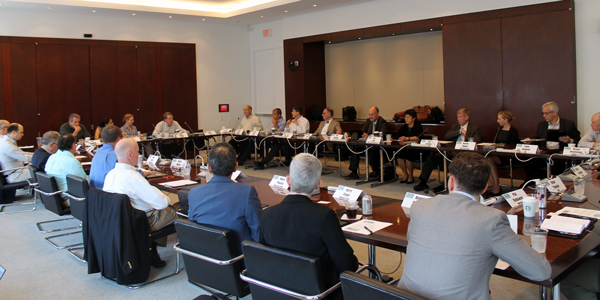By Michael Brooks
WASHINGTON — Industry opinions vary on the prospects for a full-fledged RTO in the Western Interconnection, with some optimistic and others thinking there are too many snags for it to work.
But that doesn’t mean market services can’t expand there in some other form, attendees of the Western Power Issues Roundtable said last week.
The 11th annual gathering, held by the Western Power Trading Forum in the offices of law firm Skadden Arps, came after several shakeups in the interconnection this year, including SPP pressing pause on its plan to integrate Mountain West Transmission Group and the announced demise of Peak Reliability. (See Still ‘Committed,’ SPP Halts Mountain West Integration Effort and Peak Reliability to Wind Down Operations.)
SPP’s efforts took a hit in April when Xcel Energy’s Public Service Company of Colorado (PSCo) subsidiary, representing 40% of Mountain West’s load, said it would leave the group. Peak, the reliability coordinator (RC) for most of the interconnection, had been attempting to create a new energy market in partnership with PJM. But in July it said would shut down as early as next year after CAISO moved to leave and provide its own RC services, attracting interest from nearly all of Peak’s customers by offering lower-cost services.
Kenna Hagan, senior manager of planning, policy and strategy at Mountain West member Black Hills Corp., said Xcel’s announcement, made late Friday, April 20, “floored many of us.” She said she called PSCo on Monday morning, saying, “‘I’m just checking to see if your executives were participating in Colorado’s state holiday.’”
But she assured attendees that Mountain West “is not dead.” She said group members are still examining the costs and governance structure of joining SPP without Xcel, but the current priority for everyone in the interconnection, not just Mountain West, is finding a new RC provider. CAISO has said most of the interconnection have signed letters of intent with it, but Hagan said at least two balancing authorities have pledged with SPP.
“I don’t think you can underestimate the time, creativity and effort that it takes to solve” the issues related to integration, Hagan said.
Stu Bresler, PJM senior vice president of market operations, said that though it has ended its relationship with Peak, “to the extent that there is a desire for folks in the West to continue talking about the possibility of developing their own market, we’re still interested in being involved.”
The plan remains the same as before Peak’s end: provide energy, ancillary and financial transmission rights markets. Then, should members “want to go down the path of an RTO,” expand to transmission and interconnection planning.
“We certainly are not saying it’s now or never,” Bresler said. “If now is not the right time to look at this, PJM is certainly not going anywhere.”
All Eyes on California
CAISO has also suffered setbacks in its efforts to expand, but those plans now appear closer than ever to becoming a reality.
A bill that would allow the expansion, AB813, passed the California State Assembly last year, and it’s now before the State Senate’s Appropriations Committee after passing two other committees in June. (See CAISO Regionalization Bill Edges Toward Senate Vote.)
“We are still very optimistic about 813 passing this year,” said Phil Pettingill, CAISO regional integration director. The two-year legislative session ends at the end of this month. If the bill passes the Senate before then, “it’s just a matter of the two houses reconciling it and sending it to the governor.”
But many at the conference expressed skepticism that CAISO would become an RTO, even if the bill passes. The bill would only allow CAISO to expand if it agrees upon a modified governance structure — and at least one transmission owner outside the state agrees to join.
Some in the West are concerned that a new RTO would be subject to California’s influence more than any other state’s. California has been one of the most aggressive in the U.S. in trying to curb carbon emissions and address climate change, while states such as Wyoming and Utah still heavily favor coal.
Former FERC Commissioner Tony Clark, senior adviser at Wilkinson Barker Knauer, wondered, even with “the most independent board you could possibly imagine … can you still get to a broader regional market, because you still have the inherent tensions between competing state public policies, state mistrust of each other… Maybe the [Energy Imbalance Market] is as far as we get.”
Wyoming Public Service Commission Chair Bill Russell said, “It’s probably a bigger risk for California than it is for the rest of us. I think California would be giving up more than the rest of us, and I don’t know if that happens.”
He noted that California wants to offload its abundance of renewable energy. “California is trying solve a problem. … We are open to the idea of an RTO, but for us, it’s just an option. We’re not trying to solve a problem.”
Russell opened the roundtable by admitting that “everyone in this room knows more about [RTOs] than I do.” When PacifiCorp told the PSC it was working with CAISO on expansion in 2015, none of the commissioners had even heard of RTOs, he said.
Now, he said, they are watching CAISO, SPP and PJM very closely. Given the concerns over governance, “the best solution for the West might be two markets, or three, that have various comfort levels for whoever’s doing those markets,” Russell said.
[EDITOR’S NOTE: An earlier version of this story incorrectly stated that AB813 would not allow CAISO to expand unless at least one transmission owner outside the state agrees to join by the end of 2018.]




